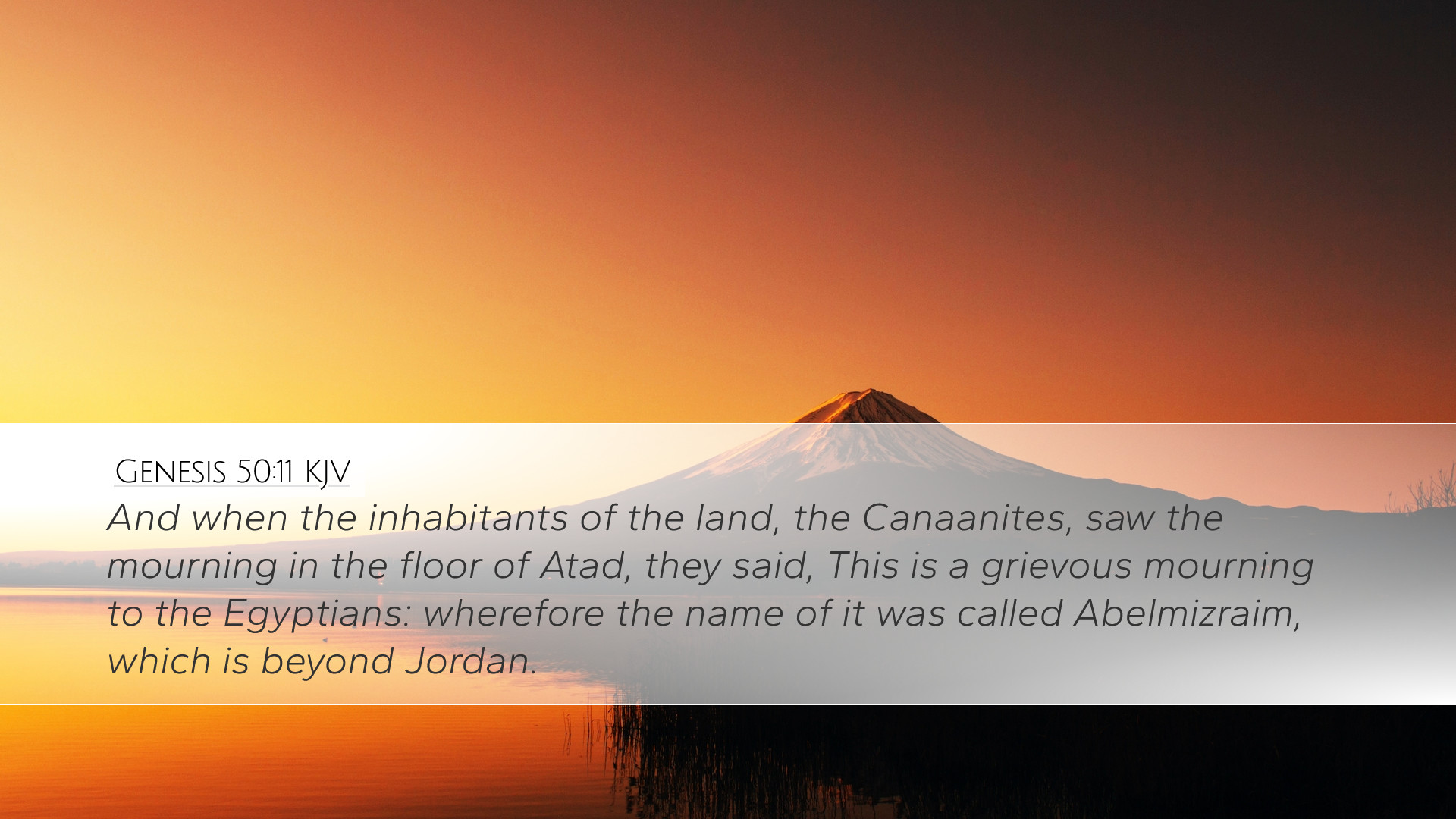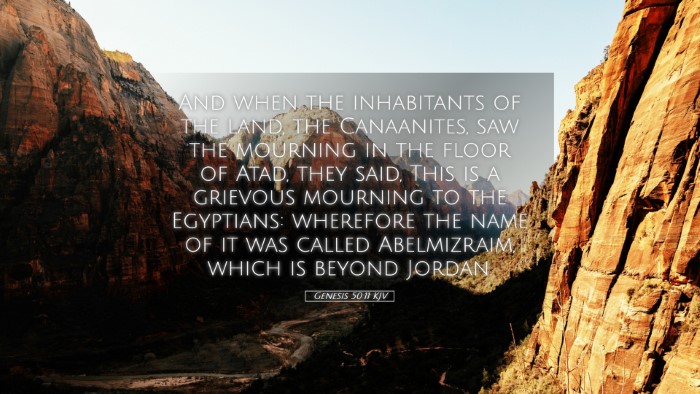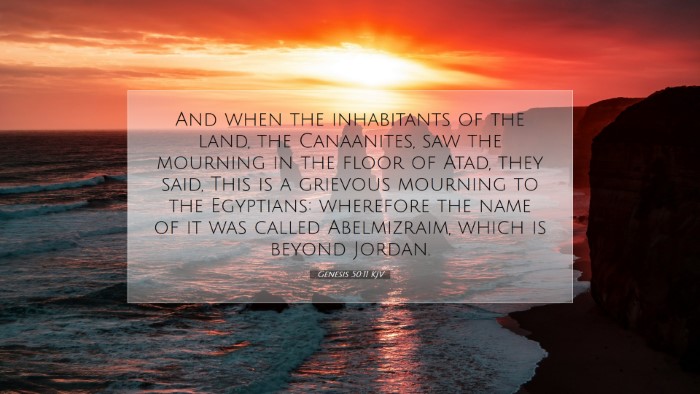Commentary on Genesis 50:11
Genesis 50:11 provides rich theological insights and reflects on the intricate nature of mourning and the profound themes of loss, forgiveness, and divine providence woven throughout the narrative of Joseph and his brothers. This commentary draws from the wisdom of public domain sources, including the works of Matthew Henry, Albert Barnes, and Adam Clarke, and aims to provide meaningful reflections for pastors, students, theologians, and Bible scholars.
Text of Genesis 50:11
“And when the inhabitants of the land, the Canaanites, saw the mourning in the floor of Atad, they said, This is a grievous mourning to the Egyptians: wherefore the name of it was called Abelmizraim, which is beyond Jordan.”
Contextual Understanding
To fully grasp the weight of Genesis 50:11, a brief look at its context is essential. This verse occurs at the conclusion of the story of Jacob and Joseph. Jacob has passed away, and Joseph, along with his brothers, mourns deeply, paralleling the sadness of the Egyptian community. This moment is pivotal, not only for the personal grief of Joseph but also for the implications of their actions on the broader community.
Mourning as a Cultural Expression
Matthew Henry's Insights: Matthew Henry observes that mourning was a universal expression of loss, and the Egyptians, despite their differing customs, were deeply moved by Jacob's death. He emphasizes the significance of shared grief, which transcends cultural boundaries. The public nature of this mourning, especially in a foreign context, indicates not only the respect held for Jacob but also the weight of loss that all communities experience.
The Significance of Atad
Albert Barnes' Commentary: Barnes highlights the location of the mourning at the "floor of Atad," noting that this space becomes a significant landmark in the narrative. He suggests that the choice of location symbolizes a place of transition, connecting the patriarchal lineage with the Egyptian influence and foreshadowing the future of Israel in Egypt. The name "Abelmizraim," meaning "the mourning of the Egyptians," underscores how Jacob's death resonates significantly with the land's inhabitants, indicating a spiritual and social impact that extends beyond mere familial ties.
A Broader Theological Implication
Adam Clarke's Reflection: Clarke provides a broader theological insight into the verse, linking the act of mourning to the divinely ordained plans of God. He suggests that such events remind the faithful of mortality and the need for reconciliation with divine providence. The Egyptian response to the mourning underscores the principle that grief is a fundamental aspect of the human experience, reminding readers that death and loss are integral parts of life, calling forth reflection on eternal truths.
The Impact of Jacob's Death
Jacob's demise impacts not only his family but also the whole region, leveling a profound grief. The reactions of the Canaanites and Egyptians signal the acknowledgment of Jacob’s character and legacy. This collective mourning suggests that Jacob was respected beyond his family ties, serving as a bridge between the Hebrew people and the Egyptians.
- The Role of Community in Mourning: Grieving in community reflects a deep-seated respect for shared humanity. The Canaanites and Egyptians coming together in this moment illuminates the inherent truths of empathy and loss that connect different people groups.
- Identity and National Reflection: The Egyptians recognized the mourning of Jacob as significant and worthy of acknowledgment, reflecting on shared human experiences of grief despite national differences.
- Divine Providence: The narrative represents the divine orchestration of events, wherein Joseph's journey from adversity to authority ultimately benefits both his family and the surrounding nations, highlighting that God's plans often utilize circumstances of grief for greater purposes.
Applications for Pastors and Theology Students
This passage offers rich applications for pastoral ministry and theological study, particularly in the areas of grief, community, and divine sovereignty:
Pastoral Care
Pastors can draw from this narrative to teach their congregations about the significance of mourning and the importance of community support in times of loss. The shared expressions of grief demonstrate to believers that they are not alone in their sorrow, an essential ministry of presence in the life of any church.
Cultural Sensitivity
Understanding that mourning can take various forms in different cultures encourages pastoral care providers to be culturally sensitive and aware, thereby fostering a more inclusive environment where all expressions of grief are honored and validated.
Encouraging Reflection on God’s Providence
In teaching sessions, educators can encourage students and church members to reflect on the sovereignty of God in their lives, helping them recognize moments where personal grief may lead to greater understanding of God's love and plans for redemption.
Conclusion
Genesis 50:11 serves as a pivotal point reflecting the weight of Jacob's passing, showcasing how nature of mourning affects both family and community while pointing to the overarching theme of divine purpose in life's transitions. By weaving together insights from notable biblical commentators, this commentary invites believers to ponder the complexities of grief, the impact of legacy, and the providential hand of God guiding human history.


